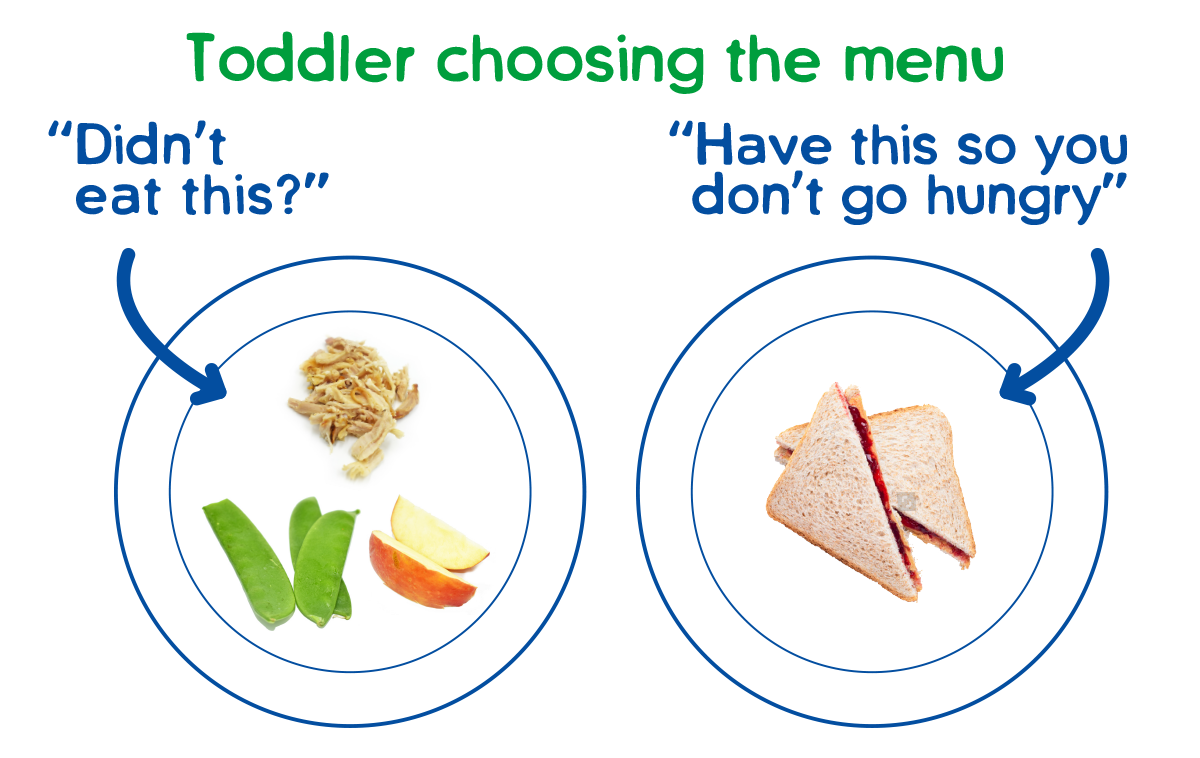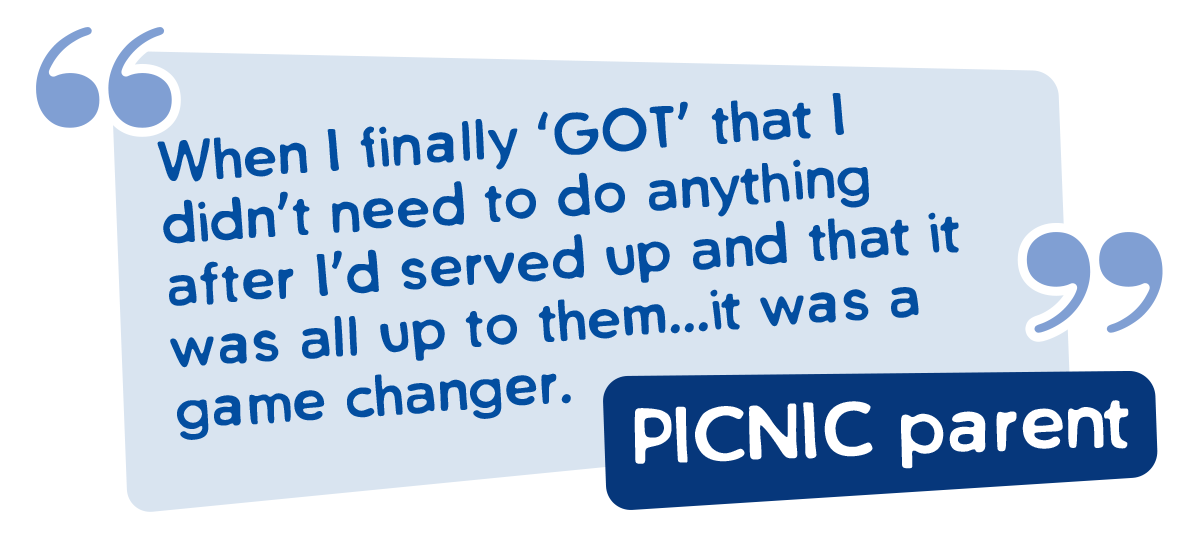Feeding Roles
Summary
- ‘HOW’ we feed is just as important as ‘WHAT’ we feed.
- Feeding roles help your toddler develop a healthy relationship with food and enjoy a variety of foods.
- Parents feeding roles are to decide WHERE, WHEN and WHAT foods are served to children.
- Your toddler’s feeding role is to decide WHETHER they’ll eat or not and HOW MUCH they’ll eat from the food you’ve provided.
- Taking over toddlers feeding roles or letting them do yours has short and long term negative results.
On this page
After toddlers turn one, food rejection increases. Sticking to our own feeding roles can become challenging… but if we do, we can avoid some of the battles and stress of feeding.
What are the feeding roles?
‘How’ we feed our toddlers is summarised with the ‘feeding roles’.
The feeding roles are the roles our toddler and us (parent/carer) need to be in charge of when feeding. Neither you nor your child should have any say on the others role. This is really important to stick to in our toddlers feeding journey.
Parents and carers decide…
Which foods to provide
When and where food is served (mealtimes).
Our toddlers decide…
Whether to eat any of the food provided or not
How much they’ll eat from food served
Which foods to eat from food served.
These roles don’t change until our children move into their teenage years and become more independent, spend more time away from home, and start controlling all the feeding roles. By then, if you’ve both stuck to these feeding roles, you’ll have given them a great start.
If we stick to our own feeding roles, we can help our toddler grow up…
- Eating the right amount of food for their growth and development
- Eating a greater variety of food
- Having a better relationship and more enjoyment of food.

Parents decide which foods are served up.
Adults are in charge of which foods to provide. We have the best knowledge of the foods to provide, as we have the best knowledge of nutrition. It makes sense that we decide the foods that our toddlers are served.
Your toddler just isn’t qualified to be choosing the menu! Children are more likely to choose foods that are less challenging in taste and texture, easier to chew and higher in salt, fat and sugar. Children need to learn to eat what adults eat.
We can worry about their eating when they reject a meal. If we then provide them a different food we know they’ll eat… they are choosing the menu and taking over our role.
A great example of what happens when adults let children be in charge of the ‘WHAT to eat’ is the kids menu at a cafe or restaurant. The kid’s menu is usually full of less challenging foods, less variety and is usually poorer in nutrition content than the adult’s menu.

You provide the foods your toddler will choose from. Children will often only eat familiar foods that are less challenging, while leaving other foods on the plate. Choose a mix of foods they know and have eaten before, while exposing them to some foods they are still getting used to. For more information visit new foods and increasing variety.
It is important for toddlers to learn that you won’t provide them another food because they have rejected the foods you’ve served.
We do need to make sure there is an ‘accepted food’ that our toddler eats regularly on the plate. We can then feel better about not offering an alternative if they haven’t eaten much. Sometimes they just don’t get their favourite foods.
Parents are in charge of setting the mealtimes
Adults decide when meals and snacks are provided. This allows children time to get hungry and then leave the meal satisfied. A regular and consistent mealtime routine helps children know they can rely on meals being provided. They can then eat enough at each meal until they are satisfied.

If toddlers are allowed to decide when they are served food, eating will become continuous and unpredictable, as they graze over the day. This adds to your workload, they are less likely to eat meals, nutrition suffers, and it is more difficult for them to learn about hunger and fullness. For more information visit Structured meals and meal environment.

Feeding toddlers whenever they want just adds to our workload… We can do without that!
Toddlers control their own eating
They might eat… they might not
After we have served up, we leave them to eat without pressure. We don’t give any encouragement or guidance on what to eat from their plate, aside from help them cut foods up or help in other ways.
If our toddler doesn’t eat or doesn’t eat much, they may not have felt like eating… they’ll get another opportunity to eat at the next meal.
If they only eat from one food group… They will gradually increase the variety they eat at future meals, as they get familiar with the new more challenging foods.

When the roles get mixed up
It is very common for parents/carers to try and get children to eat foods they haven’t eaten. This is taking over their role by either pressuring them to eat more or less by restricting their eating. This is likely to have the opposite effect to what we want to achieve.
We can run into problems such as:
Short term
- Greater stress at meals (for you and them).
- Becoming a fussy eater.
Long term
- Losing the ability to know when they are full.
- Eating less variety of food.
- Eating a less nutritious diet.
You may not notice the progress in your child’s eating, but they will be increasing their skills, courage and food variety over time.
It is neither a good nor a bad thing whether our child eats or not. We need courage and trust when they seem to eat too little (our opinion!) and when they seem to eat too much (our opinion again!).
Our bodies are very good at letting us know when we are hungry and full. Constant interfering, by asking children to eat when they no longer want to, can disrupt this. Out toddler eating when hungry and stopping when full, is something we want to protect. Always allow children to decide when to stop eating.
For a more detailed look of parents the impact of parents taking over the child’s role go to ‘Pressuring Toddlers to Eat’ and ‘Restricting Toddlers Food’.
- Satter E. Eating Competence: Definition and Evidence for the Satter Eating Competence Model. Journal of Nutrition Education and Behavior. 2007;39(5, Supplement):S142-S53.
- Savage JS, Fisher JO, Birch LL. Parental influence on eating behavior: conception to adolescence. J Law Med Ethics. 2007;35(1):22-34
- Black MM, Hurley KM. Responsive Feeding: Strategies to Promote Healthy Mealtime Interactions. Nestle Nutr Inst Workshop Ser. 2017;87:153-65


